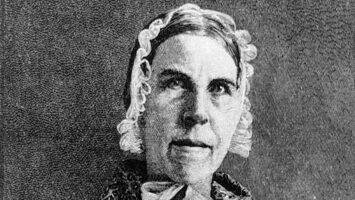Woman as a Moral Being
Grimké, a prominent abolitionist lecturer and early feminist, criticizes the legal status of women under English and American law.

Blackstone, in the chapter entitled "Of husband and wife," says:-- >"By marriage, the husband and wife are one person in law; that is, the very being, or legal existence of the woman is suspended during the marriage, or at least is incorporated and consolidated into that of the husband under whose wing, protection and cover she performs everything. For this reason, a man cannot grant anything to his wife, or enter into covenant with her; for the grant would be to suppose her separate existence, and to covenant with her would be to covenant with himself; and therefore it is also generally true, that all compacts made between husband and wife when single, are voided by the intermarriage. A woman indeed may be attorney for her husband, but that implies no separation from, but is rather a representation of, her love." Here now, the very being of a woman, like that of a slave, is absorbed in her master. All contracts made with her, like those made with slaves by their owners, are a mere nullity. Our kind defenders have legislated away almost all our legal rights, and in the true spirit of such injustice and oppressions, have kept us in ignorance of those very laws by which we are governed. They have persuaded us, that we have no rights to investigate the laws, and that, if we did, we could not comprehend them; they alone are capable of understanding the mysteries of Blackstone, &c. But they are not backward to make us feel the practical operation of their power over our actions. . . . This law that "a wife can being no action," &c., is similar to the law respecting slaves. "A slave cannot bring a suit against his master, or any other person, for an injury -- his master, must bring it." So if any damages are recovered for an injury committed on a wife, the husband pockets it; in the case of the slave, the master does the same. >“In criminal prosecutions, the wife may be indicted and punished separately, unless there be evidence of coercion from the fact that the offense was committed in the presence, of by the command of her husband. A wife is excused from punishment for theft committed in the presence, or by the command of her husband.” It would be difficult to frame a law better calculated to destroy the responsibility of woman as a moral being, or a free agent. Her husband is supposed to possess unlimited control over her; and if she can offer the flimsy excuse that he bade her steal, she may break the eighth commandment with impunity, as far as human laws are concerned.